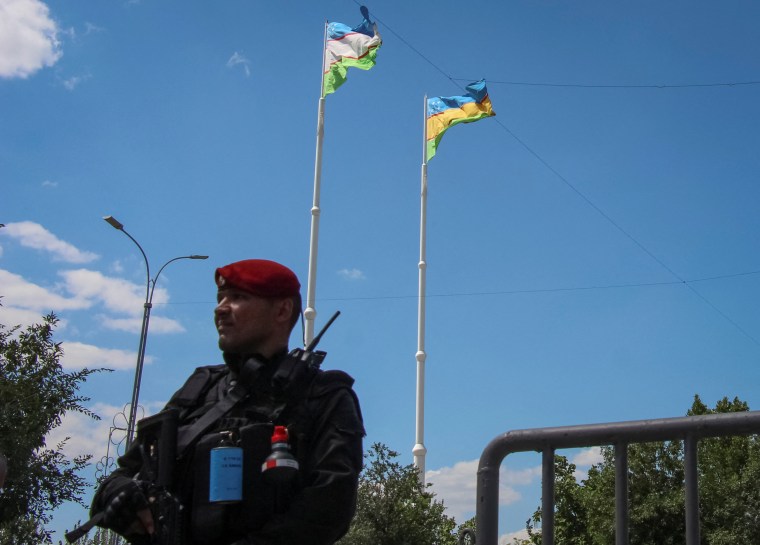Stockholm, March 16, 2023 – Uzbekistan authorities should ensure that members of the press are not prosecuted for their work and should refrain from attempts to intimidate journalists and their families during trials, the Committee to Protect Journalists said Thursday.
On Friday, March 17, a court in the southern city of Bukhara is scheduled to announce a verdict in the trials of Abdimalik Khozhanazarov, chief editor of the Yel Khyzmetinde and Akmangyt Tangy newspapers, and Yesimqan Qanaatov, former chief editor of Yel Khyzmetinde and correspondent for the UzA state news agency, according to news reports and a statement by the country’s Supreme Court.
Authorities accuse the journalists of organizing protests and publishing articles advocating separatism, and prosecutors have requested they each receive seven-year prison terms, those reports said.
Khozhanazarov and Qanaatov are among dozens of defendants accused of participating in July 2022 protests against proposed changes to the Uzbek constitution that would have affected the sovereignty of the autonomous Republic of Karakalpakstan.
While authorities have allowed reporters to attend the trials of those accused of participating in the protests, three human rights advocates familiar with the situation told CPJ that information about the defendants’ cases has been extremely limited and authorities have threatened defendants with longer prison terms if their relatives share documents with the media or speak to reporters or rights advocates.
“While Uzbek authorities have portrayed the trials over last summer’s protests in Karakalpakstan as a model of transparency and justice, the reality is that widespread fear of government retaliation has severely restricted information about these cases,” said Carlos Martinez de la Serna, CPJ’s program coordinator, in New York. “Authorities should publicly disclose the exact allegations against each journalist involved in these cases, drop any charges in relation to their work, and ensure they and their families are not intimidated into silence.”
Qanaatov reported on cultural and environmental topics, while Khozhanazarov wrote about local social issues, four members of the Karakalpak diaspora familiar with their work told CPJ on the condition of anonymity.
Prosecutors accuse Khozhanazarov of “publishing articles with separatist ideas,” “gathering citizens’ suggestions” on proposed constitutional amendments, and organizing protests, according to news reports. Qanaatov is accused of “preparing and publishing articles based on ideas of separatism” and organizing protests.
Previously, on January 31, a court sentenced five other Karakalpak journalists and bloggers over their alleged roles in the demonstrations.
Yel Khyzmetinde founder Dauletmurat Tazhimuratov was sentenced to 16 years on multiple charges, including organizing the protests and conspiracy to seize power, and Lalagul Qallikhanova, founder of independent outlet Makan.uz which closely covered the protests on Telegram, was given an eight-year suspended sentence on charges of conspiracy to seize power, organizing the protests, and distributing socially dangerous materials, according to reports.
Bakhtiyar Kadirbergenov and Seydabulla Medetov, bloggers who collaborated with Tazhimuratov on YouTube and Telegram reports, were sentenced to seven years, while Yel Khyzmetinde freelance reporter Azamat Nuratdinov was sentenced to five years of parole-like “restricted freedom.”
News reports and video footage show Tazhimuratov publicly opposed the amendments and called for and led peaceful protests; Qallikhanova published a video appeal calling for Karakalpaks to secede from Uzbekistan.
But five Karakalpak journalists and members of the Karakalpak diaspora who spoke to CPJ on condition of anonymity for fear of reprisals said Tazhimuratov, Qallikhanova, and Kadirbergenov were the most prominent of a small number of critical journalists in Karakalpakstan and they believed their punishments were also retaliation for their reporting.
Those people said Tazhimuratov’s critical articles about social issues and local authorities in Yel Khyzmetinde were new for Karakalpakstan’s heavily controlled media and they believed authorities were using the trials to silence people associated with this newspaper.
Tazhimuratov’s sister said officers from Uzbekistan’s State Security Service have repeatedly threatened to jail members of her family if they speak to the press. CPJ contacted lawyers, family members, and colleagues of those detained journalists, but they did not answer or refused to speak citing fear of surveillance and retaliation.
CPJ emailed the Uzbek prosecutor general’s office and Ministry of Internal Affairs for comment but did not receive any replies. The Supreme Court of Uzbekistan told CPJ by email that it was not able to provide more information about specific cases but stressed that the trials were open to the public.
